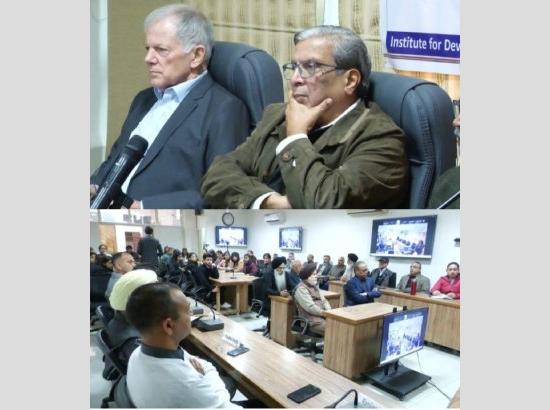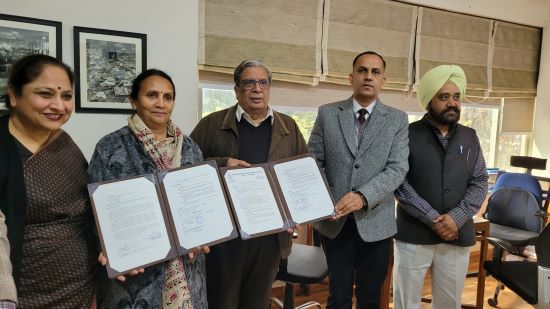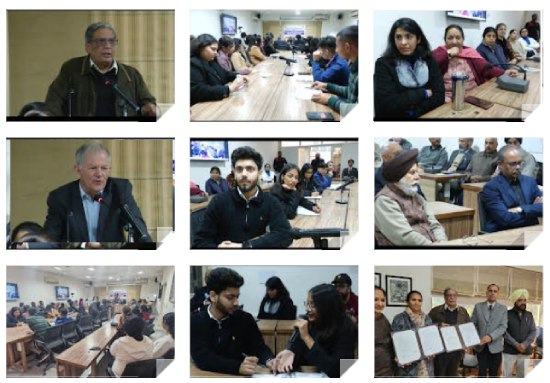
Photo Source: Babushahi Bureau
Bangladesh Political Scientist Prof. David Taylor apprehends shift of Bangladesh from being a People’s Republic to an Islamic Republic; Watch Video
Lecture on “Bangladesh: Domestic Turmoil, Conflicting Identities, and Regional Security at IDC, Chandigarh
Babushahi Bureau
Chandigarh, January 31, 2025:“One may witness a change in the preamble of the constitution of Bangladesh from being a People’s Republic to an Islamic Republic in near future,” said Prof. David Taylor while delivering an expert talk organized by the Institute of Development and Communication (IDC) in collaboration with Post Graduate Government College (PGGC), Sector-11, Chandigarh, the event was attended by over 50 academics, policy experts, researchers and students to discuss the existing turmoil in Bangladesh and its implications for the regional peace and security.
Examining the domestic turmoil and conflicting identities, Prof. Taylor emphasized the democratic off-tracking of Bangladesh from a secular and modern Islamic country towards radical Islamization, given the rising presence of fundamentalists.

Having risen from Bangla nationalism, the forces behind the incidents of the July 2024 student movement, on the one hand, could turn it into a political movement and, on the other hand, could successfully spread the idea of Bangladesh nationalism.
He highlighted that the Bangladesh nightmare will certainly have substantive, if not severe, implications for regional relationships, peace and security. Prof. Taylor also elaborated on the shifting political scenario in Bangladesh, analyzing the role of the Awami League, economic policies, electoral processes, and the factors leading to recent political upheaval.He delved into the growing discontent with the autocratic regime of Sheikh Hasina, which had been in power since 2008.

He analyzed the leadership of the student movement, the role of Jamaat-e-Islami and other political entities, and the potential shift towards Islamic values in governance.
He also raised concerns about the status of the Hindu minority in Bangladesh, the possible geopolitical realignments and domestic policy shifts, and the recalibration of Bangladesh-India diplomatic ties.
Dr. Pramod Kumar, Chairman of IDC, stated that the lecture provided a platform for critical discussions on internal conflicts and identity politics affecting regional stability.
Prof. Deepak Kumar Singh of the Department of Political Science, Panjab University, who chaired the session, categorically underscored the democratic erosion of Sheikh Hasina’s leadership over the past 15 years.
The reintroduction of the quota system for government jobs was identified as the immediate trigger for mass mobilization, particularly among students, but underlying issues such as rising unemployment (20 per cent) and economic slowdown were also central to public resentment. He further emphasized the importance of democratic resilience and civil society’s role in shaping political narratives.
He explored the roles of Bangladesh’s key political players, including the Awami League, Bangladesh Nationalist Party (BNP), and Jamaat-e-Islami, questioning whether new leadership can move beyond the existing conservative and orthodox frameworks to establish a more inclusive and sustainable democratic system.
Watch Video
He remarked on the emergence of political movements in Bangladesh as a sign of progressive change, underlining the need for sustained academic engagement on these issues. Prof. Singh argued that the recent democratic backlash, similar to Sri Lanka’s recent political transition, represents a potential turning point for Bangladesh.
The possibility of students and young leaders forming a new and alternative political platform would be a promising development for the country’s future governance.
The event was attended by senior academicians Prof. H.S. Shergill, Prof. B.S. Ghuman, Prof. Ronki Ram, Prof. D.N. Jauhar, Prof. Manjit Singh, Prof. Lallan Baghel, Prof. Sunil Kumar Sinha, Sh. J.R. Kundal, Dr. Varinder Sharma, Prof. Deepshikha, Prof. Gurinder Kaur, Dr. Sanjeev Kumar, Dr. Chandan Awasthi among others.
In addition, a key highlight of the event was the signing of a Memorandum of Understanding (MoU) between IDC and PGGC-11, strengthening collaborative research on security issues.